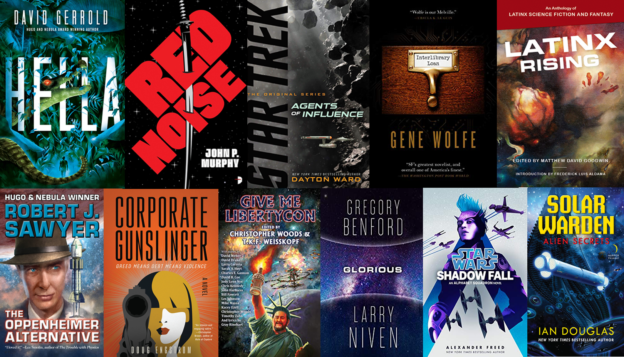Originally Published: Amazing Stories, https://amazingstories.com/?p=202037
Last month certainly ended with excitement and good news for science fiction fans with the successful crew launch and docking of Dragon at the ISS. It’s a measure of how much SpaceX is normalizing space travel that we know Bob and Doug by their first names, rather than the more formal recognition of earlier pioneers like Lindberg, Glen, or Armstrong. But now that the excitement is over for a while, you’ll be needing some interesting science fiction to read. You’ve come to the right place.
Rob Swayer kicks off the month with The Oppenheimer Alternative, where the team of physicists that created the atomic bomb face the end of life on Earth, not from atomic weapons, but from a solar event they’ve discovered will take place around 2030. It’s a deeply researched secret history that may or may not be alternate history. Then we’ve got a pair of stories about women with attitude, starting with Red Noise by John P. Murphy in which a mysterious ex-spook decides to clean up a corrupt space station in the middle of a gang war, and Corporate Gunslinger by Doug Engstrom, in which a college student takes a job in customer service to get out of debt, the twist being that if you don’t like the offer you get from binding arbitration, you can face her in the dueling arena.
Agents of Influence (Star Trek: The Original Series) foreshadows a few of Kirk’s problems with Klingons from the movies and does a really excellent job of channeling the feel of the original series. That’s no surprise really, coming from veteran Star Trek author Dayton Ward with six TOS novels and lots of other “TOS-adjacent” novels/novellas to his credit. Speaking of Star Trek: TOS connections, David Gerrold is back with Hella, a coming of age in a colony on a planet where everything is supersized, including the problems of the autistic young protagonist. The month closes out fittingly with the Gene Wolfe’s final novel, Interlibrary Loan, the sequel to A Borrowed Man (2015) in which you could check out cloned copies of dead authors for chats about their work, or in the case of noir novelist Ern A. Smythe, solve a mystery.
I also take a look at two anthologies: Latinx Rising: An Anthology of Latinx Science Fiction and Fantasy edited by Matthew David Goodwin and full of a wonderfully diverse collection of takes from the Latino/Latina worldview, and Baen’s Give Me LibertyCon put together by Christopher Woods and T.K.F. Weisskopf, which is a tribute to the founder and staff of one of the South’s most beloved cons. It’s clearly a labor of love for the authors involved and a good read.
Take a look at my Other Recommendations for books I wish I’d had time to read, and the links to what other reviewers came up with in my Usual Suspects section. If you can’t wait for these titles to be released, check out last month’s column.
Novels (in order of publication)
The Oppenheimer Alternative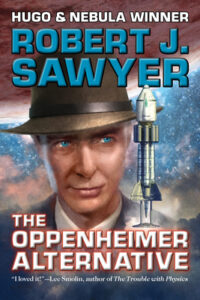 by Robert J. Sawyer 06/2/2020 SFWriter.com INC
by Robert J. Sawyer 06/2/2020 SFWriter.com INC
We all know Rober Oppenheimer as the head of the Manhattan Project that created the atomic bomb during World War II. We know that he watched the test at Trinity and quoted the Hindu sacred text the Bhagavad-Gita saying ‘Now I am become death, the destroyer of worlds’. What you didn’t know was that his team at Los Alamos stumbled on a problem with the sun, one that would result in the incineration of the Earth in about 90 years…about the year 2030.
Sawyer weaves an extensive collection of real events into his secret history as “Oppie” grapples with inner demons, herds his scientific cats, and faces political and military power plays, first to end the war, then to save the world. The book succeeds most as a wonderful thought experiment; what would the greatest scientific minds of 1950 do faced with the end of the world? To them, it’s a “sweet problem,” one worthy of their efforts as the atomic bomb was not.
There are alternate histories, and there are secret histories, and Rob Sawyer has come up with a novel that will challenge the reader to decide which The Oppenheimer Alternative is right up to the final page. It’s a brilliant idea executed by one of the genre’s best craftsmen. You know Sawyer will get the science right because he’s Sawyer, but here he digs in deep to get the history right while messing with it just a tad.
I only wish he’d started at the end of the Manhatten Project rather than using the first 25% of the book to introduce those players and set the stage. Still, the effort to build the bomb is interesting in its own right, and Sawyer has added just enough fictionalization to humanize the characters. I’m always a bit leery of alternative history because I’m not a history buff to begin with and I hate the idea that I’ll overlap reality with fantasy. This, however, is fairly easy to tease apart, despite the abundance of real events cited, and the author has a page on his website devoted to letting you know what he made up, and what is solid fact.
Red Noise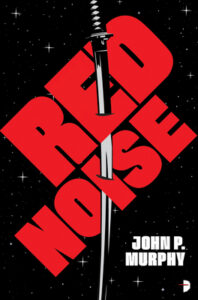 by John P. Murphy 6/9/2020 Angry Robot
by John P. Murphy 6/9/2020 Angry Robot
Cue up the theme from The Good, The Bad, and The Ugly, and meet the woman with no name, at least not if she can help it. She’s an ex-spook from some war that left military asteroids to be converted into stations, and she tries to stay as far from other humans as possible, working a mining claim in an asteroid belt somewhere. Down on fuel, food, and funds, she reluctantly heads for the nearest station and arrives to find a stalemated gang war, a corrupt company official, and a security chief all too happy to take bribes and look the other way. Station 35 is the pits, and she can’t wait to take her money and leave.
But she doesn’t. Maybe it was meeting the few decent types there, or maybe it was not wanting to get fleeced for her ore, or maybe she’s not as heartless as she’d like to be, but she stays and sets out to clean the place up. And by clean the place up, I mean to paint the gravity plated floors red while making a lot of noise int the process. Pity they don’t allow firearms on the station–she’ll just have to make do with her sword.
I liked the character pretty well, though I think she needs another book or two to develop. I liked the ship and the obsession with plants. I especially liked that the author decided to let a punk (Corbert) go from a random asshole to someone willing to take a stand.
I really didn’t like the author’s conceit of calling the main character “The Miner” all the time. First off, that’s not who she is, and secondly, it’s not a proper name and shouldn’t be capitalized. More on the name, did he give it away with the sharpshooter medal? If so, waste of a core concept. And another thing. Gravity Plates. Really. again? Even if there was any science that said they were possible, you know they wouldn’t work that way, with attraction falling off as a square of the distance, making them pretty useless except for collecting space station dust. Using spin gravity would have made the book more attractive to readers of say, “The Expanse,” and playing with Coriolis effects would have made the gun and sword fights a lot more interesting.
On the other hand, I’m interested enough to see what happens when she gets to Station 36. Hopefully less killing.
Agents of Influence (Star Trek: The Original Series)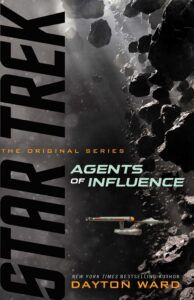 by Dayton Ward 06/9/2020 Pocket Books / Star Trek
by Dayton Ward 06/9/2020 Pocket Books / Star Trek
Late in the Enterprise’s 5-year mission, Admiral Nogura sends Kirk and the crew on a mission to recover Federation intelligence agents after their escape from the Klingon Homeworld, as well as the crew of the Endeavor, which had originally been tasked with the job but ran into…difficulties.
Ever willing to take the risky away missions, Kirk winds up conducting the search for a damaged and possibly destroyed Endeavor in an asteroid field in the neutral zone that has strange radiation that plays havoc with sensors. Spock gets to stand by with the Enterprise while he and Scotty figure out what’s going on with the sensors, and Jim gets to bait Orion Pirates in a disguised Starfleet intelligence runabout.
Dayton Ward is no stranger to Star Trek novels or short stories. with dozens of works to his credit, so it’s no surprise that he nails the feel of the TOS crew, James T. Kirk, commanding. If I’ve got any complaint, it’s that the movies have made Kirk’s Klingon konflict too central to the story, making space seem too much like Cold War 20th century Earth, and not enough like the grand adventure TOS could be. Regardless, it’s a good read for anyone hankering to get back to the original cast and story.
Corporate Gunslinger by Doug Engstrom 06/16/2020 Harper Voyager
by Doug Engstrom 06/16/2020 Harper Voyager
In this not-too-distant future, being in over your head in student loan debt could lead to a lifetime of servitude, which is what Kira Clark’s MFA in the theater was going to do for her. Signing up for training as a corporate gunslinger, in a world where customer service is handled on a dueling field, seems like the lesser of two evils, thanks to a signing bonus that keeps her out of slavery.
The staying alive part is more problematic.
Kiri’s acting comes in handy, as she throws herself into the role of a cold-blooded killer until the odds catch up with her. What she doesn’t realize is that every time you kill, a piece of you dies as well. Now she’s got one last chance to score big, clear her debts and live happily ever after, or die trying.
The story is told in two timeframes, with a tantalizing bit leading up to her ultimate fight against another pro starting most chapters before settling in to take her from trainee to blooded gunfighter. The challenge to the reader is to not zoom ahead to find out how the fight ends. You’ll want to stick with the character to find out who she is when she steps onto that dueling field.
I wish the protagonist was more likable, but her chameleon nature and “Death’s Angel” persona put me off a bit. She is in a dire fix, facing down a debt that keeps growing, and she does get there in the end.
There’s little future tech here to make this science fiction, which makes it the best sort of science fiction, one about using the future to explore ideas society and the individual. Corporate duelists as an alternative to binding arbitration may not be in our literal future, but as a mirror to our society, it’s not far off.
Hella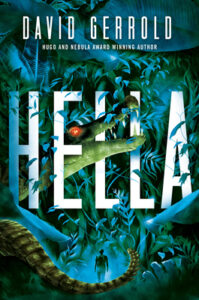 by David Gerrold 05/16/2020 Daw
by David Gerrold 05/16/2020 Daw
Kyle is about to come into his legal adulthood on a colony world where everything is supersized, from the local plants and animals to his difficulties fitting in. That’s tough enough for anyone, but he’s “neuro-atypical”, unable to read people’s emotions or figure the subtext to their context. To help him cope, he’s got a chip implanted that links him to the colony’s archives, though it’s not clear how that helps, except for making him more nerd than he already is. Fortunately, he’s got a mother and older brother that love and accept him, as well as Captain Skyler, legendary leader, explorer, and father figure to both boys.
It’s a classically Heinleinian setup and the first person narrative has much the tone of a Heinlein Juvenile, updated by one of the masters of the genre. Gerrold has put a ton of work into the ecosystem of Hella, a lighter-than-Earth planet with massive, no, really massive, plants and animals, and Kyle is the perfect fact-obsessed reporter to tell us about it.
For the first half of the story, that’s what we get, along with some friction from members of the colony that may have crawled out from under a rock. Funny thing is that it works. Just being along for the ride as Kyle goes on his first recon ride into is worth the trip, but gradually political intrigue rears its head and Kyle finds himself at the center of a fight to save the colony from abandoning its cooperative spirit and aping the have and have-not dilemma that’s about to cause Earth’s society to collapse. The arrival of the last colony ship brings things to a head and forces Kyle to face his demons head-on.
This looks to be a stand-alone, but I enjoyed it.
Interlibrary Loan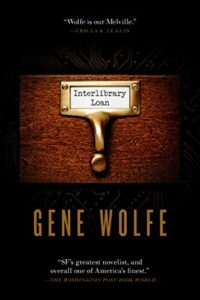 by Gene Wolfe 05//2020 Tor Books
by Gene Wolfe 05//2020 Tor Books
This sequel to A Borrowed Man (2015), Wolf’s tale of cloned copies of dead writers that can be checked out of a library in a dystopian future, stars the same character as the first: 20th-century noir mystery writer Ern A. Smythe in all his hard-boiled elocution. Don’t blame him for the way he talks–he’s wired that way.
In the first book, Ern got checked out in the hope that he could solve a mystery. That was good for him because if reclones don’t get read, it’s off to the furnace for them. Lightning strikes the mystery writer clone again as he’s requested by another library, in the small town of Peggy’s Cove, where a reclusive woman wants him to find her husband. That’s not all that happens along the way, but if you’re expecting a hard-boiled noir PI piece, you may be disappointed As Ern will tell you, he’s a writer, not a detective, but he knows human nature pretty well, and it turns out that’s more than half the battle.
Gene Wolfe died in 2019, so we nearly didn’t get this book. If you’re a fan, you’ll hear the author’s voice coming through the characters, even if he plays ventriloquist through a variety of genre authors, from cookbooks to westerns. If you’re not already a fan, this probably isn’t the place to start. It’s not impenetrable prose by any means, but its hooks are subtle, not overt, and newcomers might be left wondering what the fuss was about. Those readers would do better to start with The Best of Gene Wolfe, which featured many of his best short fiction works.
Collections, Anthologies, and Novellas
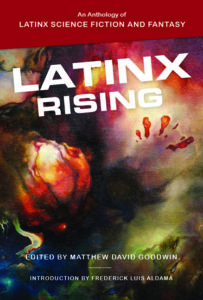 Latinx Rising: An Anthology of Latinx Science Fiction and Fantasy by Matthew David Goodwin and Frederick Luis Aldama 06//2020 Mad Creek Books
Latinx Rising: An Anthology of Latinx Science Fiction and Fantasy by Matthew David Goodwin and Frederick Luis Aldama 06//2020 Mad Creek Books
When you read Latinx Rising, and I hope you do because it’s a wonderful collection of diverse voices from the other side of the looking glass, you may ask yourself, is this story fantasy or science fiction? Goodwin has made a point of picking stories here that make this a difficult question to answer, which is good because it’s the wrong question to ask.
For me, science fiction is at its best when it poses what-if questions that alter your point of view. Latinx literature, as the editor points out in his forward, can’t get away from the taint of magical realism, which differs from fantasy in that the surreal is just there, and everybody goes on about their day. There are occasional touches of the surreal here, but beyond that, whatever happens in these stories is just there and you find yourself swept along with it. Past lives regression in a castle or zombie plague in the Dominican Republic, it’s there, and it’s real and the people are the thing.
Latinx Rising covers a lot of ground and speaks in voices that are clearly of the culture while also managing to be accessible to outsiders. The stories are all written by “U.S. Latinos and Latinas,” and are a mix of published and unpublished pieces. It’s a well-executed anthology, and Goodman has taken time to give a few comments about each author, which I appreciate, especially since so many of them were new to me. There were enough familiar faces, like Ernest Hogan, to make me feel connected, but the real value of this book is to expand your horizons, and Latinex Rising does a fine job of it.
Give Me LibertyCon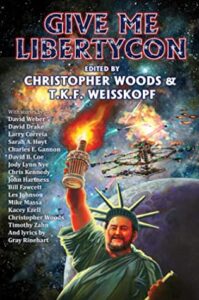 by Christopher Woods and T.K.F. Weisskopf 06/2/2020 Baen
by Christopher Woods and T.K.F. Weisskopf 06/2/2020 Baen
If you’re into the literary science fiction con scene, you probably know that Liberty Con is a real con held in Tennesse, where you’ll often find authors who lean towards the libertarian side of things. From all accounts, it’s a terrific con run by friendly folks, and Chris Woods decided to give back by putting together an anthology that “Tuckerizes” the entire crew, using each of their names in stories as a tribute. Shortly after coming up with this plan, the con’s founder, Timothy “Uncle Timmy” Bolgeo passed away, and it became even more important to honor him and the crew. A veritable who’s who of mil SF and libertarian-leaning folks agreed with him and Give Me Liberty Con was the result.
The stories in here are uniformly excellent. Gripping tales of fighting off all manner of evil hordes–zombies, dark mages, people who hate books–and, more importantly, of people coming together in common cause to put themselves on the line for things they believe in. The authors are impressive storytellers, including David Weber, David Drake, Charles Gannon, Timothy Zahn, and others, but what really comes through is the love for “Uncle Timmy” and the con crew.
Since the authors are predominantly older white males, it’s an interesting contrast to the other anthology listed here, Latinx Rising, and I think it would be awesome if people read both. Science fiction is large, it contains multitudes of viewpoints, and as fans and readers, we should too.
-
- Junker Blues: Mars by Lon E. Varnadore 06/1/2020 Amazon Publishing Services
- Rise & Shine by Patrick Allington 06/2/2020 Scribe
- CTRL S: A brilliantly gripping near-future adventure for fans of Ready Player One by Andy Briggs 06/16/2020 Orion
- Glorious: A Science Fiction Novel (Bowl of Heaven Book 3) by Gregory Benford and Larry Niven 06/16/2020
- Shadow Fall (Star Wars): An Alphabet Squadron Novel by Alexander Freed (Author) 06/23/2020 Del Rey
- The Sunken Land Begins to Rise Again by M. John Harrison 06/25/2020 Gollancz
- Alien Secrets (Solar Warden Book 1) by Ian Douglas 06/30/2020 Harper Voyager
Here you’ll find some links to some reliable lists for new releases and other reviewer’s lists for the month, which I may update as they come in. You might check them out at:
- Amazon.com: Editor’s Picks – Best Books of the Month: Science Fiction & Fantasy
- Goodreads: Science Fiction New Releases
- Kobo: New & Hot in Science Fiction & Fantasy
- Gizmodo:
- Locus Magazine (online): Forthcoming Books
- Reading List (Andrew Liptak): Reading List
- Tor.com:
- Wired:
About the Reviewer’s Pics:
For the most part, this list sticks to what appeals to me as science fiction, about which I’m willing to be fairly flexible, but if here there be dragons, you can expect to find some tweaked DNA to explain it. I make up this list based on what I’ve read, what I heard and what I’m looking forward to. Please note that these are my selections, and do not represent the opinions of the editor or publication.
You can find me on Facebook at @Ernest Lilley or on my blog @ beingErnest
